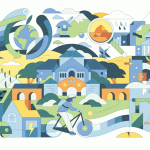Sustainable projects: newly opened Stanford Doerr School and Dartmouth Summit on Health, Wealth, and Sustainability4 min read
Reading Time: 3 minutesReading Time: 3 minutesIn a world of limited resources and limitless innovation, education plays a vital role in raising the next generation’s awareness of the principles and measures to protect their present and future. The training of specialists and new leaders falls on educational institutions, where decision-making skills are formed, value orientations are established, and a shared understanding of large-scale global problems emerges. Lifelong learning education engages people of all ages in an active process of finding answers to global challenges. In contrast, in-depth business education provides them the ability to make effective strategic decisions within the framework of short-term goals and in relation to the long-term perspective at different levels. Climate change or any other large-scale environmental degradation affects everyone, even if it’s not as noticeable today. Everyone must rethink their attitude towards a culture of sustainability to follow a better future and contribute to creating and maintaining a greener and healthier planet.
Now the Stanford Doerr School of Sustainability is open! The first School of Sustainability in the world has a variety of programms, including the following departments:
Social Sciences Division – The division is launching with two distinct areas: Environmental Behavioral Sciences and Global Environmental Policy;
Earth System Science – focus areas in Climate Science and in Environment & Ecosystems;
Geophysics – focus on applying expertise to fundamental research sustaining life on Earth, combining underlying science with studies of Earth’s environment and resource needs;
Geological Sciences – the properties of minerals, rocks, fossils, soils, sediments and water, using multiple lenses; stratigraphy, paleobiology, geochemistry, and planetary sciences;
Energy Science and Engineering – combine theory, experiment, and simulation to transform the global energy system to sustain the people and the planet;
Oceans – to Discover, Educate, and Innovate to support a Known, Sustainable, and Equitable Ocean;
Civil and Environmental Engineering – focus on engineering for sustainability with an emphasis on cities, energy, infrastructure, public health, and water.
Interdisciplinary programs: degrees for undergraduate, master, and PhD students
Earth Systems Program – students learn about and independently investigate complex environmental problems caused by human activities in conjunction with natural changes in the Earth system;
Emmett Interdisciplinary Program in Environment and Resources – the physical and natural sciences, engineering, social sciences and humanities, law and policy, medicine, and business
Change Leadership for Sustainability Program – prepare leaders to radically accelerate the transition to a more sustainable society.
A crucial element of this initiative for Sustainable Development is the Sustainability Accelerator, which focuses on short-term policy and technological solutions to immediate problems in the world. The accelerator concept has undergone more than two years of development and iterations with a committee co-led by Majumdar and Noah Diffenbaugh, professor of Earth system science, followed by a transition workstream co-led by Deborah Sivas, professor at Stanford Law School, and Thomas Jaramillo, associate professor of chemical engineering and of photon science, with input from stakeholders across the university. In 2022, the Accelerator is already funding the first group of 30 teams whose multidisciplinary projects aim to advance sustainable development solutions through partnerships at the local, regional and global levels. The Sustainability Accelerator is a place for the co-development of potentially scalable sustainability technology and policy solutions with external partners worldwide to substantially and measurably improve the quality of human life and our planet. The accelerator provides valuable opportunities for students to learn how to develop, implement, and scale their ideas.
Other business schools are also trying to take steps towards sustainability, and the problem of funding is solved with the help of charity. The Tuck School of Business at Dartmouth has received the largest gift commitment in the school’s history, an anonymous donation of $52.1 million to host the Dartmouth Summit on Health, Wealth, and Sustainability for global leaders from the private and public sectors, academic researchers, and students with help of more than 81% of its alums. “The wickedest challenges facing our world need new solutions informed by new ways of thinking. This summit will be a powerful and lasting demonstration of our school’s mission to prepare wise, decisive leaders who better the world through business”, – said Tuck School dean Matthew J. Slaughter. The business school also created the One Dartmouth initiative to promote interdisciplinary solutions based on research and collaborations within the framework of the aforementioned summit. As stated by Ben Caldecott, Oxford’s Professor of Sustainable Finance, tackling global problems requires the global financial system to be aligned with environmental sustainability. Participants are invited from all over Dartmouth, including the Geisel School of Medicine, Thayer School of Engineering, the Guarini Schools of Graduate and Advanced Studies, the Arthur L. Irving Institute for Energy and Society, the Rockefeller Center for Public Policy, and the John Sloan Dickey Center for International Understanding. These kinds of incentive initiatives to stimulate solutions to health, wealth, and sustainable development provide the impetus to find interdisciplinary solutions for a better present guided by rigorous research and infused with visionary leadership.
GIF by sustainability.stanford.edu




